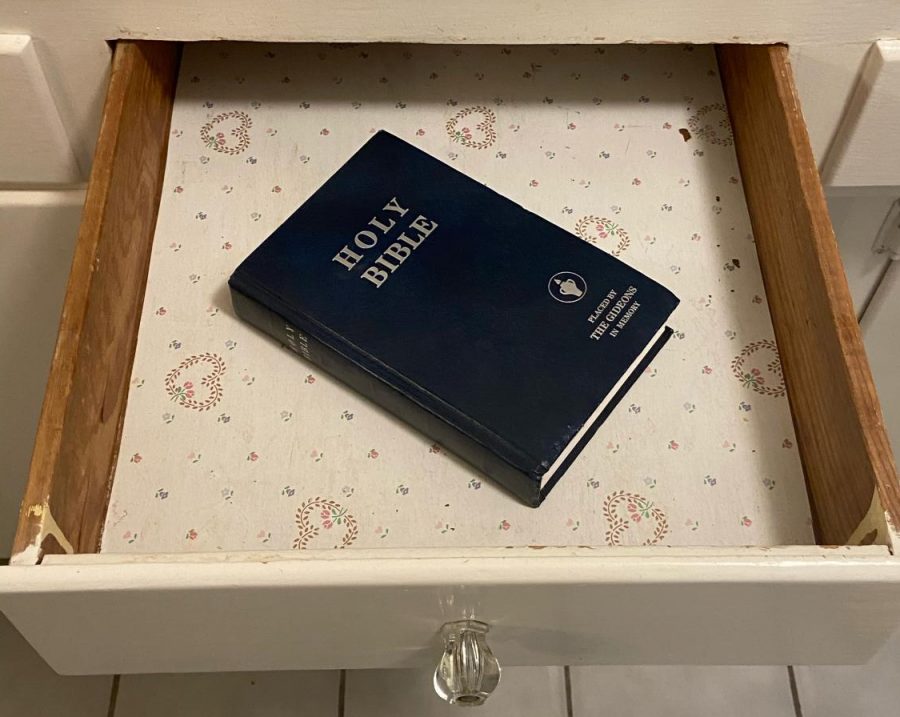Opinion: Should we separate church and hotel?
Why does one religion’s text get more representation than others? Having bibles in hotel rooms isn’t fair to everyone else. Photo by: Livia Vertucci
December 7, 2020
BYOB (Bring your own Bible).
Religion has been around for thousands of years. With thousands of different faiths and beliefs, why is it that only one religious text is provided in hotels? Over the break, on a trip with my family, I noticed that only Christian bibles were supplied in hotel rooms. It didn’t sit well with me as someone who doesn’t align with any religion. In fact, it made me a little uncomfortable, feeling a mixture of pressure and longing to expand my knowledge of other religions. Bibles have been a prevalent part of my world, we learn and sing songs related to christianity, but we never received information about other religions that are just as important. With so many different faiths, it seemed unfair to only provide a Christian bible, neglecting those who don’t identify with a specific faith.
The Gideons International Association, hoping to spread the good faith to travelers, pays for and distributes Bibles to hotel rooms. Not all rooms have a Bible, but most do. Knowing this, I wondered, if there is a Bible, shouldn’t there also be a Quran or a Torah, or should religious texts even be a part of a hotel visit?
Ventura High students have varying opinions on this subject. “Considering how Christianity is a popular religion in the U.S., it only made sense that the Bible is provided,” said sophomore Miles Becker. “I think we should keep the Bible and add more religious texts due to the fact that the U.S. is a country that is always changing and more religions [are] being practiced.”

Religion is always a sensitive subject. Throughout history, we’ve seen violence, wars and change based on religion. So, should we add more text to the hotel Bible drawer, or should they be removed altogether, removing forced religious beliefs from a simple hotel stay?
One thing is for sure, any change we make will cause controversy. On the one hand, if additional religious texts are added, more travelers may feel more accepted and comfortable. But with so many different religions, how can we be sure we have included them all? On the other hand, if Bibles were removed and no other texts are added, accidentally forgetting to represent a religion would be avoided altogether, and hotel rooms would be may be more comfortable for non-religious travelers.
About 70% of the U.S. population identifies as Christian, according to Pew Research Center. This raises the question, should the solution be based only on what most of the population identifies with a certain religion?
Freshmen Daphne Raymond shared her opinion, “I think [just providing the Bible] isn’t right solely based on the fact that there are many other religions other than Catholics and Christians.” Daphne also mentioned why we need more diversity when it comes to religion, “I think we should provide all religious texts instead of none because some people feel unsafe without the base object of their religion.”
Do we want to continue to only provide the bible, or do we want to make a change? As a non-religious person myself, having the bible present in every single hotel room sends the message that my beliefs aren’t as important or as credible as the beliefs in the Bible. Instead of having the Bible already present, people should bring their own religious text if they feel the need. Sure, people can just not look in the bible drawer, but even having it inside the room is like imposing religion onto another person. In this country, we have the right to freedom of religion. While I’m in a hotel room, I want to feel that freedom. No matter what side of the argument you’re on, it’s important to think about how other people think. Having a sacred book removed can be scary and feel unjust, but having a Bible in a hotel may push religion onto people who don’t necessarily believe.







![Lindsay Guzik, new assistant principal said, "I am settling in [at VHS] pretty well. I know a lot of the students, so that makes it a little bit easier coming from Cabrillo, and it's been nice to see them all grown up." Photo by: Abraham Kassa](https://thecougarpress.org/wp-content/uploads/2025/09/IMG_9728-300x200.jpg)
